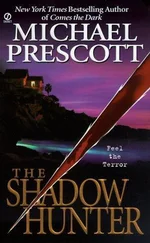Michael Walters - The Shadow Walker
Здесь есть возможность читать онлайн «Michael Walters - The Shadow Walker» весь текст электронной книги совершенно бесплатно (целиком полную версию без сокращений). В некоторых случаях можно слушать аудио, скачать через торрент в формате fb2 и присутствует краткое содержание. Жанр: Полицейский детектив, на английском языке. Описание произведения, (предисловие) а так же отзывы посетителей доступны на портале библиотеки ЛибКат.
- Название:The Shadow Walker
- Автор:
- Жанр:
- Год:неизвестен
- ISBN:нет данных
- Рейтинг книги:3 / 5. Голосов: 1
-
Избранное:Добавить в избранное
- Отзывы:
-
Ваша оценка:
- 60
- 1
- 2
- 3
- 4
- 5
The Shadow Walker: краткое содержание, описание и аннотация
Предлагаем к чтению аннотацию, описание, краткое содержание или предисловие (зависит от того, что написал сам автор книги «The Shadow Walker»). Если вы не нашли необходимую информацию о книге — напишите в комментариях, мы постараемся отыскать её.
The Shadow Walker — читать онлайн бесплатно полную книгу (весь текст) целиком
Ниже представлен текст книги, разбитый по страницам. Система сохранения места последней прочитанной страницы, позволяет с удобством читать онлайн бесплатно книгу «The Shadow Walker», без необходимости каждый раз заново искать на чём Вы остановились. Поставьте закладку, и сможете в любой момент перейти на страницу, на которой закончили чтение.
Интервал:
Закладка:
“Does there seem to be a link to the other murders?” Nergui asked.
“To the first, anyway,” the Minister said.
“The decapitation?”
“Exactly.”
“Any clues on identity?”
“None, apparently. Just like the others.”
“Right. I assume you’ve spoken to Serious Crimes-”
“Nergui,” the Minister said. “You know as well as I do that the state police department, Serious Crimes or otherwise, is divided pretty equally between the corrupt and the inept. They could barely cope with the theft of a tourist’s bicycle. Why do you think I was so keen to co-opt the one decent brain I found in the place? From where I’m sitting, this is a priority. No, this is the priority. Forget all the banking and state corruption stuff. We can afford to let them steal a bit more. I want you back there to sort this one out.”
Despite himself, Nergui momentarily felt his spirit lighten, but his better judgment prevailed. “I really don’t think that’s a good idea. And, with respect, your comments aren’t entirely fair. Doripalam’s an excellent man-”
“Which is why, if I recall, he got the job as your successor with barely five years’ experience under his belt. As I understand it, he was the only one there with a degree of integrity and two brain cells to rub together. But he’ll be out of his depth with this, and I want it sorted quickly. I’ve already told them you’re going back. I’ve told them to give you whatever you need. But get it dealt with.”
Thanks, Nergui thought. The police always love being told what to do by politicians. Especially when it’s the prodigal son returning from his cushy billet as the Justice Minister’s favored lackey. And for all their friendship and mutual respect, Doripalam was unlikely to be first in the welcoming committee. He was already fighting an uphill struggle to gain credibility with the longer-serving but much less able officers who were now reporting to him. The enforced return of Nergui at the first sign of difficulty was hardly likely to strengthen Doripalam’s position in the team.
Nergui couldn’t help feeling some irrational guilt. In his heart, he knew-and he suspected that Doripalam would also know-that this was exactly the development that he’d been quietly fantasizing about throughout the whole of the last six mind-numbing months.
“Okay,” he said at last. “If you say so, Minister. I’ll do my best.”
The Minister hung up. Nergui stared for a moment at the receiver, wondering why it was that the politician judged it appropriate to dispense with all the standard courtesies in his dealings with others. Then, hesitating only momentarily, he dialed Doripalam’s number.
“It’s okay,” Doripalam said, before Nergui could launch into an explanation. “I’ve already been told. At least now I know why you were so keen to meet for coffee.” “Doripalam, that’s not-”
“No, I know. I was joking. I’m not exactly overjoyed, but I don’t imagine this is your fault. At least I hope not. We have to make the best of it.”
“I’ll try to make it as painless as possible,” Nergui said. “Really.”
“Yes,” Doripalam said. “I’m sure you will.”
An hour later, Nergui stood silently with the young man, examining the desolate spot where the third body had been found. The body itself had been taken away for the post mortem. Nergui had seen it briefly, but it had told him nothing except how disgusting a mutilated human body can look. Which was something he already knew too well.
They were on the edge of the city, the dark green mountains rising behind them. This was one of the areas where the population still lived largely in the traditional round nomadic tents, rather than in the endless rows of faceless apartments that had grown during the Communist era. The presence of the tents was commonplace, even in this urban environment, but Nergui, after his time in the West, found it jarring.
It was tradition, of course, a way of life uniquely appropriate to the climate and lifestyle of the country. But it was a strange way to live, he thought, as though the inhabitants were trying to deny the city’s existence, desperate to be up and on the move instead. Or perhaps that was not so odd. In this land, it was the city, the presumption of permanence, that was the aberration. And there was no question that the tents were solid and comfortable enough with their wooden frames and brightly painted doors, the thick felt and canvas of the walls. With the central stove burning, a few glasses of vodka, and the shared body heat of a family, it was possible to repel even the harshest of Mongolian winters. And Nergui had to acknowledge that the clusterings of family groups, the ails, offered a sense of community that was different from anything he had ever known.
But the body had been found outside all of this, dumped in a scrubby knot of fir trees in a small ravine. It was a bleak spot, especially so late in the year when, even at midday, the low sun barely penetrated its shadows. There had been a stream running through here, but the dry autumn had left the ground parched and cracked. The trees and bushes were scattered with garbage, rusting tins and rotting cardboard discarded from the camp above.
Earlier that morning, an aging guard dog, left prowling by the edge of the camp while its owner sat outside his tent boiling water for tea, had suddenly raced off into the ravine, barking endlessly. By the time the owner had caught up, the dog had been snarling at a bundle dumped in some bushes. Even without touching the object, the owner had had some premonition about its contents and had backed up the slope to track down the local police.
It was fortunate that he had not looked more closely. The state of the body was even worse than that of the first. The head and hands had been removed, the severed neck and wrists yawning bloodily, and there were similar large knife wounds to the chest, this time cut savagely down to the bone. There was little blood and the body had not yet begun to decay. The murder had clearly happened in some other location, and relatively recently. The pathologist had quickly concluded that death had been caused by the stab wounds, but that again the removal of the limbs had taken place after death. Given the cold weather, it was difficult as yet to pinpoint the time of death precisely, but the killing had probably taken place overnight or even earlier that morning, perhaps only some six or seven hours before. It was not clear how the body had been transported to this spot, although it would not have been difficult to get a van or truck close to the edge of the ravine.
The victim was dressed in a heavyweight burgundy del, the traditional garb of the herdsmen out on the steppes, a heavy robe wrapped around the body, tied with an ornate but faded belt, designed to combat the rigors of the Mongolian winter. Such clothing was still commonplace even in the city, particularly among the older residents.
“Can we identify the clothing?” Nergui asked. “This isn’t one of those mass-produced Chinese suits.”
Doripalam shrugged. “We might. But I’m not optimistic. The del and the boots are both years old, though they’ve worn well. The labels have been removed. That stuff could have been made or purchased anywhere in the country. Probably goes back to Soviet times.”
“So what else do we have?”
“Not much. Another male, probably in his late forties, fairly short and stout, and definitely Mongolian. There are no other identifying features. No other possessions. In a word-nothing.” Doripalam shook his head and then kicked at the hard ground in frustration. “Just another nameless corpse.”
It was a cold clear morning, and the temperature had dropped from the brief Indian summer of the previous week. Winter was on the way, and the young man had a heavy black overcoat pulled tightly around him. He was a slight figure, constantly full of nervous energy. He took several steps out into the scrubby wasteland and then turned back, as though pacing a room. His dark hair, Nergui noted, was perhaps slightly too long.
Читать дальшеИнтервал:
Закладка:
Похожие книги на «The Shadow Walker»
Представляем Вашему вниманию похожие книги на «The Shadow Walker» списком для выбора. Мы отобрали схожую по названию и смыслу литературу в надежде предоставить читателям больше вариантов отыскать новые, интересные, ещё непрочитанные произведения.
Обсуждение, отзывы о книге «The Shadow Walker» и просто собственные мнения читателей. Оставьте ваши комментарии, напишите, что Вы думаете о произведении, его смысле или главных героях. Укажите что конкретно понравилось, а что нет, и почему Вы так считаете.












